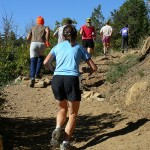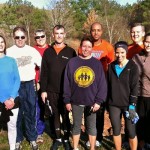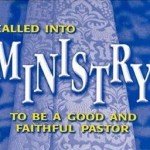Do disciples understand everything that Jesus said?
Scott at “Following His Path” has pointed out aa interesting passage in his short post “Don’t Miss What Jesus Said.”
He quotes from Luke 18:34 in which the author explains that the Twelve did not understand what Jesus had told them because “[it] was hidden from them.”
Concerning that verse, Scott says,
Do we have such a pre-conceived idea of Jesus that we miss what He says?
– understood none of these things.
– The meaning of this statement was hidden from them.
– they did not comprehend what was said.Let us not be arrogant and think we can know everything. Some things God will not reveal to us. Rev 10:14
But at the same time, let us look to God for His light. And keep our heart Prov. 4:23 soft and not hard. Hardness of heart will blind us from the truth. Eph 4:18
Now, I understand that this account happened before the Twelve (and others) were indwelled by the Holy Spirit. But, I wonder… do disciples today understand everything that Jesus said? Is it possible that some things are hidden from us today? Could something be hidden from some but revealed to others?
I think it’s possible… and I think Scott’s exhortation is valid: “Let us not be arrogant and think we can know everything.”
What do you think?
Leading from the front; leading from behind
When I first went trail running, I learned quite a bit about leading. To be honest, even though I was excited to go running on trails for the first time, I was still a bit apprehensive. Would I fall? How many times? Would I get hurt? How many people would I take down with me?
But, as we were getting ready to take off, a few people told us about the trail that we were about to run. They told us about the general condition of the trails, warned us about the rocks and roots, suggested some ways to avoid falling, and encouraged us that we could complete the trail. In fact, it was very encouraging to know that several of these people had completed this course before, especially for me and a few others who were trail running for the first time.
Then, someone who had run the trail before started running and the others fell in line behind him. At some point, someone else took the point. When we reached the 3.5 mile mark, we stopped for a few minutes to rest. Then, after a brief pause, a third person started leading us back toward our staring point. Finally, a fourth person led us through the very last part of the trail. In all, four different people ran in the lead position of our group. For one of these people, it was the first time he had run at the front of the group.
But, this was not the most important “leadership” lesson that I learned during my first experience trail running. There was one runner among us who had the most experience on trails, both this one and others. Not only was he not always at the front of our group, at times he actually fell back toward the tail of the group and started encouraging those runners. This was a true demonstration of leadership!
You see, true leading is not always done at the front. The most important leading is often done from behind or beneath… coming alongside those who are struggling or straggling… those who may be close to quitting. This leader could have easily completed this course much faster than we did as a group, but he chose to run near the rear of the group to ensure that everyone was doing well.
But, remember this important point: this person would not have been able to demonstrate this true form of leadership if he had not been willing (even eager) to give up his position at the front of the group and, in turn, allow someone else to take that position.
Leadership – especially spiritual leadership – is not about position. It’s not about getting your way, or telling other people what to do. True leadership is about helping other people. Sometimes – occasionally – that can be done from the front. Most of the time, however, true leadership is demonstrated when running beside or behind someone else.
—————————————
Spiritual Lessons from Trail Running
- Introduction: Spiritual Lessons from Trail Running
- Rocks and Roots and Leaves
- Leading from the front; leading from behind
- It’s a long, hard road, but we’re running it together
- Meeting other people on the journey
- The Destination, the Journey, and Everything In Between
- Look at your feet; look at the path; look further ahead
Don’t assume he’s that kind of Christian
Last week, I wrote a post called “What kind of Christian are you?” The point of the post is that I don’t really fit into any “mold” of Christian tradition. Of course, very few people fit into any kind of mold. Hopefully, we can treat each other as individuals – created differently by God.
Jon at “Jon’s Journey” as picked up on that theme and written an article called “I’m not that kind of Christian.” However, I think that Jon did a much better job of expressing what I was trying to get across.
He points out several Christians traditions or movements that have shaped and molded him, but also admits that he doesn’t really fit into any of those molds.
I like his last paragraph the best:
If you claim Christ as Lord, and our paths cross… Our task is not to judge, build walls, and divide. Our task is to build each other up to become more like Christ.
It seems that several people were encouraged by my post, so I wanted to point you to Jon’s as well. To me, it is even more encouraging!
Rocks and Roots and Leaves
When you run on the roads or on the sidewalk, you pretty much know what to expect. Besides the occasional pothole or crack, the surface is fairly smooth. You can spend much of your time looking ahead, way down the path that you plan to run.
When you run on trails, things are completely different. Every step is susceptible to rocks and roots and leaves. Sometimes, you see these rocks and roots sticking up out of the dirt or peeking above the leaves. But, sometimes, they are hidden.
So, you have to watch every step carefully… extremely carefully… because any little rock or root can send you sprawling through the woods at full speed. (Remember, we’re running, not taking a stroll.) At the same time, you have to keep an eye (or, at least the occasional glance) at the trail to make sure that you don’t miss a turn.
But, rocks and roots are obvious, right? I mean, everyone expects rocks and roots to be dangerous. But leaves? Why are leaves dangerous while trail running?
In fact, leaves make the path more comfortable to run on. They cushion each step. It feels great to step on a patch of leaves after running over packed dirt, rocks, and roots. So, why would I say that leaves are dangerous?
The obvious answer would be that leaves make the path slippery, and that’s true. But, that’s not the main problem. The main problem is that while leaves make the path more comfortable, leaves also hide rocks and roots, as well as stick and other hazards.
A path that looks like a comfy and cushy pillow of leaves on the surface, could actually be strewn with sharp rocks, obtrusive roots, small stumps, and any number of other hazards. That which seems to make the path easier to run (leaves) actually ends up making the path more difficult.
Let me say that one more time: That which seems to make the path easier to run actually ends up making the path more difficult.
But, isn’t this just like life? I mean, we expect certain things in life (the rocks and roots) to be difficult, tricky, and dangerous. We know that there are financial, mental, emotional, vocational, spiritual, relational, and other types of risks that pop up throughout our lives. Most of the time, we see them coming, even if they are sudden.
However, the real dangers in life are those things that appear to make life more comfortable, easier, and even more enjoyable. When our steps seem to be falling with ease, we are in the most danger of tripping. When our decisions are leading to success after success, we are closest to failing. We our relationships are strongest, we are most likely to be hurt.
What’s the spiritual lesson here? Be watchful. Be diligent. Pay attention.
Even when – especially when – things seem to be going smooth.
—————————————
Spiritual Lessons from Trail Running
- Introduction: Spiritual Lessons from Trail Running
- Rocks and Roots and Leaves
- Leading from the front; leading from behind
- It’s a long, hard road, but we’re running it together
- Meeting other people on the journey
- The Destination, the Journey, and Everything In Between
- Look at your feet; look at the path; look further ahead
We keep singing… as the hungry roam the streets
Joel at “The Double Edged Sword” wrote a post called “Leave the Walls Behind.” Like I told him in a comment, I still have decided if I’m glad that he wrote this post at all.
Most of the post (all except for two short sentences at the top) is the lyrics to a song by Leeland called “While We Sing.” (I don’t keep up with the music industry that much, so I don’t know if Leeland or the song “While We Sin” is or was popular.
Regardless of the popularity, I thought the lyrics were worth contemplating.
Here’s a video of the song (with lyrics):
By the way, before you point out that God desires for us to praise him – even with our singing – I want to remind you of this passage from Isaiah:
Hear the word of the Lord, you rulers of Sodom! Give ear to the teaching of our God, you people of Gomorrah! “What to me is the multitude of your sacrifices? says the Lord; I have had enough of burnt offerings of rams and the fat of well-fed beasts; I do not delight in the blood of bulls, or of lambs, or of goats. When you come to appear before me, who has required of you this trampling of my courts? Bring no more vain offerings; incense is an abomination to me. New moon and Sabbath and the calling of convocations – I cannot endure iniquity and solemn assembly. Your new moons and your appointed feasts my soul hates; they have become a burden to me; I am weary of bearing them. When you spread out your hands, I will hide my eyes from you; even though you make many prayers, I will not listen; your hands are full of blood. Wash yourselves; make yourselves clean; remove the evil of your deeds from before my eyes; cease to do evil, learn to do good; seek justice, correct oppression; bring justice to the fatherless, plead the widow’s cause. (Isaiah 1:10-17 ESV)
It’s clear that God desired for the children of Israel to bring sacrifices to him, but he didn’t want them in this passage. It’s clear that God wanted his children to pray to him – but not in this passage. God had told people how to honor the Sabbath and to hold special feasts, but in this passage he said he had grown weary of them.
What was missing? Why had God grown tired of these displays of affection and worship that he hod told people to bring to him? Perhaps the reason similar to the lyrics of the Leeland song “While We Sing” above…
What if God is tired of hearing all of our songs of praise for the same reason?
Spiritual Lessons from Trail Running
(Note: You may not care anything about exercising, or running, or trail running. But, please read through this post and series. I’ve learned some lessons while trail running that I think are very pertinent to our lives as followers of Jesus Christ and to our lives together as his church.)
For the past two Saturdays – December 3, 2011 and December 10, 2011 – I’ve gone trail running with some friends. A few months ago, when I first start running with the local running club, I heard about trail running. I’ve always enjoyed the woods and trails and hiking, so I thought I would probably enjoy trail running as well.
A group from the local running club goes trail running almost every week. I’ve tried to join them before, but there was always a conflict. Finally, a couple of Saturdays ago (December 3), I was able to join nine other runners for a seven mile trail run near Falls Lake in Raleigh, NC.
Last Saturday, I joined a different group, including my son, to run 3 miles on a different part of the same trail near Falls Lake. (As a side note, this trail is part of the 1000 mile long Mountains-to-Sea trail that runs from through the state of NC from the Great Smokey Mountains to the Atlantic Ocean. My daughter, Miranda, recently entered a photo contest sponsored by the Friends of the Mountains-to-Sea trail, and last week they notified her that she had won first place in the Youth Division!)
When I ran the first few steps on the trail and throughout that day of running, then again throughout the day of trail running the next week, I learned that trail running is quite different from road running. I thought about some of these differences while I was running, and I realized that there are spiritual lessons to be learned from trail running. (Obviously, some of these spiritual lessons can be learned in other ways as well. For example, a few years ago I joined some friends on a 3 day hike through part of the Appalachian trail, and I learned some very similar lessons.)
Some of the lessons were obvious, and you may can even guess now about some of the topics that I’m going to write about. But, some of these lessons are not obvious at all. In fact, looking back, some of these lessons are the opposite of what you might expect.
Over the next few days, I’m going to share some of these lessons in a blog series. While you may not care anything about running or trail running, I hope you will find these lessons challenging and helpful, especially to those of us who are following Jesus Christ.
(One final note: I made a video report before, during, and after my first experience of trail running on Saturday, December 3, 2011.)
—————————————
Spiritual Lessons from Trail Running
- Introduction: Spiritual Lessons from Trail Running
- Rocks and Roots and Leaves
- Leading from the front; leading from behind
- It’s a long, hard road, but we’re running it together
- Meeting other people on the journey
- The Destination, the Journey, and Everything In Between
- Look at your feet; look at the path; look further ahead
Scripture… As We Live It #186
This is the 186th passage in “Scripture… As We Live It.”
And whatever you ask in prayer meetings, you will receive, if you have faith put the request on enough prayer lists. (Matthew 21:22 re-mix)
(Please read the first post for an explanation of this series.)
Replay: Examples and Models of Ministers
Four years ago, I wrote a post called “Examples and Models.” I’ve added the phrase “of Ministers” to the title here, because that was the original point of the article. What does the term “Minister” mean to you? If you see a special type of Christian, then this article may be for you. You see, that’s what I thought a few years ago when I knew that God was leading me toward something… more? But what? “Well,” everyone told me, “you have two choices: pastor or missionary.” In fact, there are as many ways to serve (minister) as there are followers of Jesus Christ. I think the church needs more and more examples and models of these different kinds of “ministers.”
——————————-
I love the latest post by a new blogger, Trey from “One Man’s Journey“. The title of the post is “Walk Away for the Love of Christ?” I love his honest reflection and life-changing questions. I also see in his questions many of the questions that I started asking myself a few years ago. Here is an excerpt from Trey’s excellent post:
As my family and I sunk into a financial pit of despair, I began to read much in the realm of finance, investing, financial planning, and biblical financial stewardship. I grew to love this and can see many ways in which the average Christian and also the average church misuses the resources provided by God. I began to see myself as doing this sort of consultation work to families, small businesses, churches, and parachurch ministries once I gained the proper training. But what about seminary? What about my calling? What will my family think?
As previously, most issues discussed here have not been settled in my mind completely. I have been reminded in my prayer times that God certainly does not need me. He has managed eternity just fine before me and will do so long after I become one of saints on high. Also, why do I need the spotlight of an official pastor-elder of a local congregation? Can I not teach and serve in other ways just an important to the kingdom?
Several years ago, I also had this “calling”. Looking back, I think that God was calling me to a more committed life of serving himself and others – he was calling me to full-time ministry, although I don’t think he was calling me to “full-time ministry”. At the time, though, I only saw two options: 1) become a vocational pastor, or 2) become a missionary.
Why did I only see these two options? Well, those were the only two options that I saw modelled. These were the only examples that I saw of what it meant to serve God full-time. So, I picked one – vocational pastor – and did what I was supposed to do: I went to seminary. But, as my family will tell you, I struggled with the idea of being a full-time vocational pastor from day one. I did not think that this accurately reflected what God wanted from me, but I did not have any other categories, models, or examples to compare to.
I knew what God wanted from me: he wanted me to serve him and serve others in everything that I said and everything that I did. But, this couldn’t happen if I worked a regular job, right? I mean, regular people are distracted by work and commuting and co-workers and business trips and office parties. But, God didn’t want me to be distracted by these “secular” things, so I needed to give all of that up, go to seminary, get hired by a church in order that I could concentrate on “spiritual” things.
As Trey expressed in his blog post, I thought that the real work of God was done by those people who prominently stood before me each Sunday morning, Sunday evening, Wednesday evening, etc. These were the people who knew God and what God wanted from me and others and how to teach the Bible and how to put on Bible studies and where to find the lost people and when to schedule the Children’s program.
A strange thing happened on the way though. As I was happily preparing myself for just this type of “spiritual” vocation, I took my professors seriously, and I read Scripture to find the answers to my questions. It began with recognizing that Scripture does not call the Sunday morning routine “worship”. I asked myself, “If that’s not worship, then what is worship?” Again, I turned to Scripture for answers. From those answers, I was forced to ask other questions and search for more answers.
In fact, the more I studied and read and asked questions, the more I realized that the type of “spotlight servants” which Trey mentions – and to which I was aspiring – was not described in Scripture at all. In fact, I would suggest that “spotlight servants” are antithetical to the teachings of Jesus, Paul, Peter – in fact, all the books of the New Testament. Instead, Jesus calls all believers to be servants – not “spotlight servants”, but servants.
And, slowly, I began to understand that “vocational pastors” may be necessary to carry out what we typically see associated with church today. However, when we examine church in Scripture, we see that “vocational pastors” seem out of place. Instead, we see people shepherding as they work, and discipling wherever they are, and teaching in any context, and caring and comforting wherever they find people who are hurting. We find leaders who lead by example, not from the spotlight. We find elders who are mature and wise and known, not hired for their education and speaking abilities. We find prophets and teachers and apostles who are willing to dialog instead of monologue. We find disciples who are constantly and consistently attempting to live for Christ with the help of other brothers and sisters. We find that there is no secular and sacred divide. Through the indwelling Spirit, all things become sacred – every place becomes a sanctuary – every believer becomes a priest and a temple.
In other words, God can use me as his full-time servant when I am selling cars, or writing code, or running a business, or seeing patients. I can pastor while I am teaching in a school or college, or taking care of the home, or packing boxes, or delivering mail, or selling clothes. I can meet with other believers as the church in a church building, or in a restaurant, or in a park, or in a home, or in a car, or in an office. God was calling me – and he is calling others – into full-time service, wherever we are and whatever we’re doing.
It is my desire to live the rest of my life as an example of following God and serving him full-time in whatever vocation he provides for me. I hope that the believers who come along after me will see my example as another option when God calls them also.
Visualize every word in the Bible?
So, I saw this post/video on CNN iReport this morning called “Doug and the Bible Project.”
It sounds really good, but, to be honest, I just don’t get it. I’m not writing this to put down this project, but to honestly ask for help.
The short description sounds really good:
Doug recorded this video of himself assembling an art project that visualizes every word in the Bible.
“I really just wanted to see what it would look like to see the entire Bible all at once,” he said.
“Every page. Every word. Not just your favorite passage and ignoring what you don’t like. The whole thing. What would it look like?”
And, the video itself begins with these words:
Warning
This is not religious.
This is not political.
I just want to start a conversation.
What would it look like to see the entire Bible all at once?
You can jump over to the CNN page (link above) to watch the video, or watch it here:
I’m not going to comment on the video yet. But, I’m not certain what this guy is trying to do.
What do you think?
An inspirational light display
God cares about light displays. But, I’ll get back to that in another 200 words.
Last weekend, our friend Jared helped us string white icicle lights along our roof line. Many of our neighbors have decorated their houses, porches, trees, and yard ornaments with lights: white or multi-colored; twinkling, blinking, or steady.
Of course, there’s nothing in our neighborhood to compare to Mr. Grizwald’s light display. There are a few families in our town or the towns around us who seem to be attempting to give Clark a run for his money. And, then, there was the TV show about the houses around the country that have been decorated with hundreds of thounsands – even one million – lights.
So, are you thinking about a light display this Christmas? You should. Seriously.
Why? Because God enjoys a good light display. Jesus talked about this in the Sermon on the Mount:
You are the light of the world. A city set on a hill cannot be hidden. Nor do people light a lamp and put it under a basket, but on a stand, and it gives light to all in the house. In the same way, let your light shine before others… (Matthew 5:14-16 ESV)
Apparently, according to Jesus, God enjoys light displays that light up an entire hillside… and entire city. He wants a light display that cannot be hidden. Of course, this passage is not only about Christmas light displays, but certainly Christmas lights fall into this category.
I’m thinking that the early church’s emphasis on light displays (especially at Christmas-time) was one of the reasons (perhaps the main reason) that Paul told followers of Jesus let their lights shine in the world. Their light displays were so spectacular that their pagan neighbors could not help but notice.
So, we can see that light displays – including Christmas light displays – were important to Jesus, and they were important to Paul and the early church. If light displays were that important, then certainly they should be important to us as well. We’re not told whether we should choose white or multi-colored lights, or whether the lights should blink, twinkle, or remain on steadily. Perhaps that doesn’t matter as long as there is an awesome and inspirational light display.
Hold on one second… Are you sure? You really don’t think Matthew 5 is about Christmas lights? You think I should read further? Let me see…
You are the light of the world. A city set on a hill cannot be hidden. Nor do people light a lamp and put it under a basket, but on a stand, and it gives light to all in the house. In the same way, let your light shine before others so that they may see your good works and give glory to your Father who is in heaven. (Matthew 5:14-16 ESV)
Ah. I see. But, what about Paul telling Christians to shine their lights? That’s about light displays, including Christmas lights, right? No? We’ll see about that…
Do all things without grumbling or questioning, that you may be blameless and innocent, children of God without blemish in the midst of a crooked and twisted generation, among whom you shine as lights in the world, holding fast to the word of life, so that in the day of Christ I may be proud that I did not run in vain or labor in vain. Philippians 2:14-16 ESV)
hmm…. hmph.
Well, readers, I apologize. Apparently, someone – who shall remain nameless, but his initials are HS – wants to ruin a perfectly good inspirational Christmas message by demanding that I consider what Jesus and Paul were actually saying. Someone thinks these passages are about living our lives in a way that demonstrates our trust in God and that they have nothing to do with Christmas lights.
But, I’ll leave that up to you – my loyal readers – to decide for yourselves. If you think Jesus and Paul are talking about Christmas light displays, then I hope your house is the brightest on the block.
But, if you think they’re talking about living your life in a way that others notice and in a way that points others toward God through Jesus Christ, well, I guess that’s fine, too.
Just don’t expect to win the best decorations or tackiest lights awards this year!










